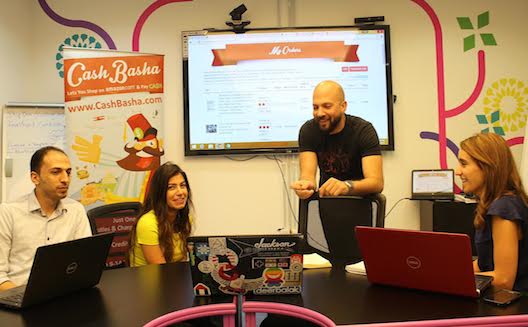Cash before delivery, the COD alternative?


The CashBasha founders. (Images via Cashbasha)
According to a 2014 Payfortreport, 80 percent of ecommerce transactions in the region occur through cash on delivery (COD).
While COD is a friendly model for consumers, it puts ecommerce merchants at great risk when buyers don’t end up paying for goods they have purchased.
Creating a fairer model that appeals to both the buyer and seller, and particularly foreign sellers, is the pain point that drove Jordanian entrepreneur Fouad Jeryes and Syrian entrepreneur Sinan Taifour to launch Cashbasha in Jordan in 2013.
Cashbasha describe themselves as a “commerce technology” company that facilitates ecommerce by shifting COD into a cash “before” delivery model. This means that money gets collected by the courier and is then transferred to the merchant before the product is delivered. Thus, if the buyer doesn’t end up paying, it would cause smaller losses to the courier and Cashbasha; and the merchant remains free of risk.
This practice also helps to avoid the need to establish a storehouse for hosting all the products that have not been paid for.
Cashbasha’s model is to work as this medium between Arab consumers and foreign sites that do not accept local cards or cash and do not ship to the region.
Cashbasha currently hosts Amazon as its only merchant. “Our system works with any [merchant], but we chose Amazon because [a high percentage] of the worldwide online purchases come from Amazon,” said Jeryes.
Knowing what to expect from online shopping
Cashbasha offers two features that make the buying process easier, distinguishing it from other similar platforms.
Buyers do not need to use the service through a personal account, which is usually required on other platforms like Shop and Ship or Egypt’s edfa3ly.com. Users can simply complete a transaction as a guest, with no attached bank account.

During their testing period Jeryes himself ordered 400 packages.
Secondly and most importantly, customers don’t need to worry about estimating customs and shipment fees. Cashbasha gives users a fixed price depending on an inbuilt algorithm. If the fees end up exceeding their estimate, Cashbasha will be responsible for paying the difference.
Today, Cashbasha collects money from the buyer through the ‘at your door’ service; it has also offered the ‘at a store’ service but has not expanded upon it.
Getting started
This is not the first time the founders have teamed up together. Before Cashbasha, they developed several projects, including “Codely”, a gamified educational product for children.
Then at the start of 2013 they built Payhyper, an API for ecommerce sites looking for a solution to COD.
“Although everyone unanimously wanted to use it [Payhyper] and it took very little time to integrate, dealing with large companies took months to get approvals by management and whatnot,” Jeryes told Wamda.
The pair soon found themselves seeing a massive opportunity in cross-border ecommerce and that was when Cashbasha came along. “We knew that most ecommerce purchases in the region were being driven by a small group of individuals with credit cards and freight forwarding accounts with logistics companies, but that was the majority of the market in MENA,” said Jeryes.
With foreign sites having a wider variety of products, and garnering more trust, they thought to take the local mentality towards payment [COD] and connect it to the sites that, they say, 80 percent of shoppers wanted to use, but couldn’t. Now they use Payhyper’s payment technology and network.
Although the founders had steady jobs, in 2014 they decided to drop it all to take the risk of building their idea.
“We felt that if we really wanted to do something, we have to be fully invested, to bite the bullet, leave everything and focus 100 percent,” explained Jeryes.
Similarly, Taifour believes that starting a company while still doing a full-time job is too stressful. “When you are still trying to prove a concept, it is emotionally very tense. You can’t have a full-time job and deal with that tension,” he said.
While testing the platform, the founders set a challenge for themselves that they believed would make it or break it. They specified a target of 60 orders to be received within one month from buyers they did not know. They agreed that if they only received 59 orders, they would close it all down.
To their surprise, they reached the target in only two days. That’s when they realized that the market was hungry for an offering like Cashbasha.
“We think its push vs. pull. Other companies need to push to the customer the service or product they offer, which is a big expenditure on the company. We, on the other hand are using the pull strategy; the customer already needs what we offer. It’s much easier this way,” elaborated Taifour.

The team working from ZINC in Jordan.
Scaling to Saudi Arabia
Other than the cash before delivery service, Cashbasha streamlines and facilitates the process of making purchases from popular foreign ecommerce through offering referred online payment methods, cross-border logistics, real-time, accurate customs estimation, and customer service automation.
After their initial release, the company has expanded to include six more team members who all work from ZINC in King Hussein Business Park in Amman, Jordan.
The company currently receives around 6,000-8,000 orders per month, and monetizes through a $5 fee added to each order, in addition to the discounts it receives from the shipping company.
The company is already making a profit and has securing strategic investments from Aramex Ventures and 500 Startups.
With that funding, Cashbasha recently began operations in Saudi Arabia. “We chose to go to KSA right after Jordan because it is the region’s ‘big fish’,” said Jeryes. “It’s a large market with consumers who are hungry for cash-based and hassle-free online shopping solutions.”


